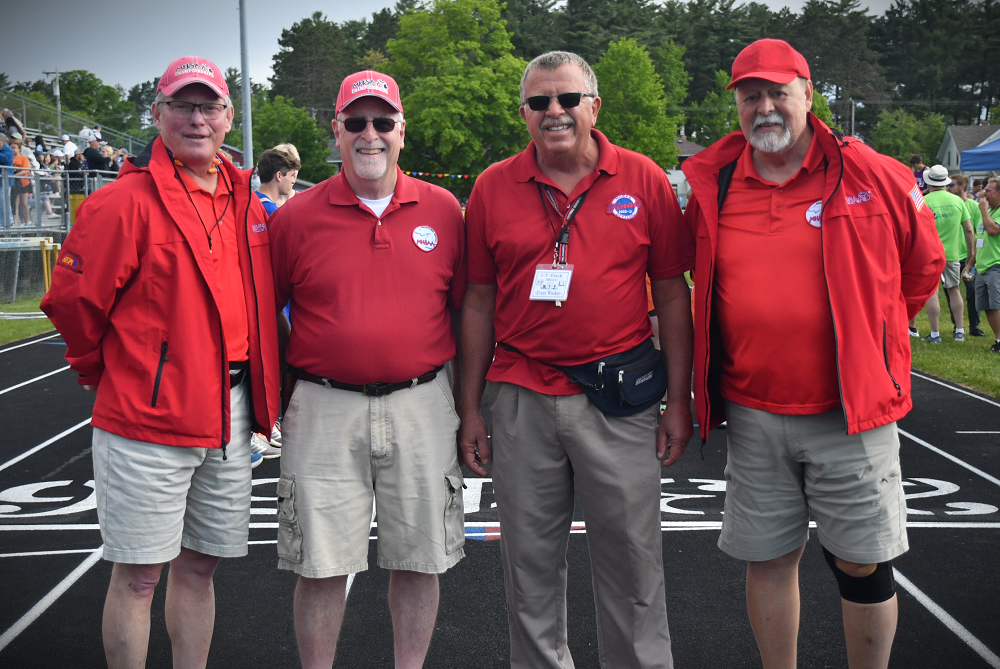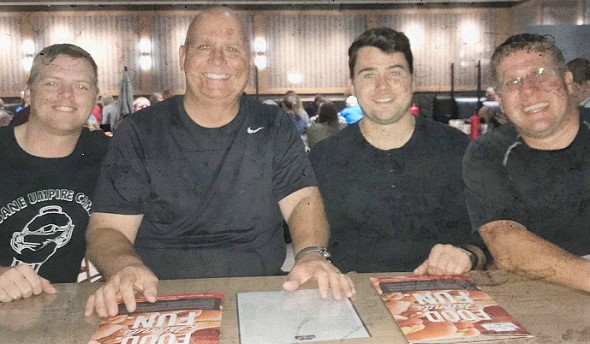
In Memoriam: Paul Price (1950-2023)
By
Geoff Kimmerly
MHSAA.com senior editor
July 14, 2023
The MHSAA recently published its annual list of officials who have reached milestone years in their service to Michigan school sports. On the “40 Years” registration list was the name of Paul Price, a longtime official most recently from Republic who has been missed greatly especially in the Upper Peninsula officiating community since his death in January.
Price, who died Jan. 9 at the age of 72, began his officiating career with the MHSAA with basketball during the 1973-74 school year. Also an educator, he taught, directed, administrated and coached in Michigan, Colorado and Michigan again. He added softball and volleyball to his officiating in 1991-92, football in 1995-96, and over the last eight years was registered in football, basketball, volleyball, cross country and track & field while also taking an active roll in leadership and mentorship in those communities.
He was a mainstay at the Upper Peninsula Track & Field Finals and was missed there at this season’s championship event in June. He’ll be missed similarly in November at the 8-Player Football Finals at Northern Michigan University, where he’d coordinated the chain crew for the MHSAA’s two championship games at the Superior Dome.
Price was a graduate of East Lansing High School and Central Michigan University, and finished his educational career in 2011 as superintendent of Republic-Michigamme Schools. He previously had served as principal and athletic director at Fife Lake Forest Area among other stops, and he was recalled as a mentor to administrators as well during his many years in education.
PHOTO Paul Price, second from left, takes a minute for an officials photo during the 2022 Upper Peninsula Track & Field Finals at Kingsford. (Photo by Cara Kamps.)

The Official View: Night with the Crew
By
Brent Rice
MHSAA Assistant Director
October 1, 2018
By Brent Rice
MHSAA Assistant Director
In this week’s edition we discuss the power of our words and delivering them proactively, examine a football rule regarding rushing the punter and take a look at an “It’s Your Call” at the volleyball net.
It’s Official!
The Words We Use: Officials face criticisms regularly for their rule enforcement, judgment decisions and even positioning. As we know, these criticisms will be tossed about whether you get plays and rulings correct or not, so there is very little we can control in this area. One area we can control the criticisms we receive is the way we speak to others.
I’ve heard people say, “I’ll give them respect when they earn it.” If that’s your line of thinking, maybe you should consider giving respect simply because it’s the right thing to do. The way you communicate as an official to coaches, players and administrators reflects on you professionally, and often is a determining factor on how these parties view you in carrying out the rest of your responsibilities. If they think you’re a bad person, they often don’t give you the benefit of the doubt in close-call situations.
There are a number of books written on the art of diffusing situations through the words you use. One that immediately comes to mind is “Verbal Judo” by George Thompson. It is rather succinct and definitely worth the read. It provides much more detail on the philosophy of word usage, but let me provide you with a couple of seemingly innocuous phrases that can draw the ire of a coach and should be avoided:
“Well, that’s the rule” – Rules citation is very important when providing explanations, but simply stating that the rule says so sounds flippant and is looked at as a cop-out. Instead, start with “By rule,” then use rulebook terminology to describe the situation and ruling.
“Calm down” – While this is much better than the cringe worthy “Shut up” or “Hush” we hear being used from time to time, it still can provoke a primal urge to respond and can actually have the opposite effect of what is intended. Instead, try getting the results you desire by having them talk it through. Try statements like “All right, I’m listening to you,” or “Okay, explain to me what you’re asking.” And when using a phrase like “calm down,” trying adding an “if” statement along with it. For instance, “I’ll explain to you what I have if you calm down.”
Rule of the Week
FOOTBALL Team R loads up the box with rushers to put pressure on K’s punt deep in its own zone. As K1 punts, R1, coming from the center of the line, just gets fingers on the ball and partially blocks it. R2, from the edge, then firmly contacts the kicker’s plant leg and sends him to the ground.
Ruling: This is not a foul (in itself). The rulebook does not provide that only the player who touches the kick is excused from contacting the kicker. This exception to the rule refers only to when “the defense touches the kick.” (9-4-5-b) Of course, this does not give carte blanche to defensive players to go out of their way to unnecessarily rough the kicker just because the ball is touched.
It’s Your Call
VOLLEYBALL The clip from this week picks up after an extended volley. As Team S plays the ball over the net for its third hit, a front row member of Team R makes a play on the ball. The questions is, are the two contacts by the front row R player legal? Why or why not?
Last Week’s IYC Ruling: The basic spot on the play is the end of the run. Using the all-but-one principle, this foul would be penalized from the spot of the foul (A’s 35). If the defense accepts the penalty, it would be A’s ball, 3rd-and-27 on A’s 20. If the defense declines, it would be 4th-and-8 on A’s 39. This is definitely an instance that you want to run the options by B’s coach before enforcing the penalty. (Click to see the video from last week.)
Official View
After a long, hard-fought Friday night contest between Rockford and Greenville, crew members (left to right) Dale Feutz, Brian Donovan, Sam Boland, and Luke Griemsman stop in at a local Rockford eatery to discuss the night’s game over a meal.

